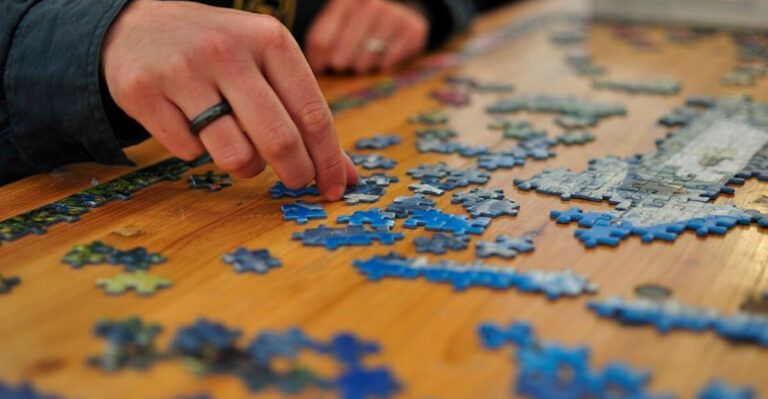All You Need To Know About Couples Counseling
What is couples counseling? When should you consider going? How do you find a therapist? Today you’ll learn all that (and more).
It is a truth universally acknowledged that relationships are HARD work unless you’re in a relationship with the fictional character Mr. Darcy. (Yes, this is a reference to Jane Austen’s Pride and Prejudice, and I’m sure she and the rest of the ladies agree with me as well. No offense intended to the male species.)
To portray the toughness of being in a relationship, I’ll name a few things every couple goes through: dealing with difficult relationship moods, tolerating each other’s stubbornness, learning to compromise and apologize when needed, staying sane.
We must not forget that relationships, just like cars, require regular maintenance to prevent any future complications.
Of course, it would be awesome if a mechanic could fix our relationship by replacing worn-out parts of it, but things aren’t that simple. That is where couples counseling, aka relationship therapy, comes into the story!
Couples therapists, licensed marriage counselors, and other mental health professionals are our ‘relationship mechanics’ who can help us prevent relationship issues, solve existing problems, and establish a healthy relationship.
Below we’ll talk about what couples counseling is, when you should consider going, how to find a therapist, and the most common types of couples therapy. I hope you’re ready!
What Is Couples Counseling?
 Couples counseling or couples therapy is a type of psychotherapy in which a licensed therapist helps couples deal with their relationship issues and improve every aspect of their union. The same thing applies to marriage counseling.
Couples counseling or couples therapy is a type of psychotherapy in which a licensed therapist helps couples deal with their relationship issues and improve every aspect of their union. The same thing applies to marriage counseling.
The primary goal of these therapies is to teach couples how to boost relationship satisfaction, set healthy boundaries in a relationship, and navigate life together as a team.
Every couples therapy includes the following general elements:
- Targeting and focusing on a specific problem
- Evaluating the relationship
- Finding solutions, implementing changes
- Establishing relationship goals
Couples therapy requires both partners to be active participants during therapy sessions so they can achieve the best possible outcome for their relationship.
What Does Couples Counseling Consist Of?
 Couples counseling is based on a variety of modalities and techniques that help partners work through their relationship issues. These techniques include open discussions, analyzing negative communication patterns, role modeling, and role-playing.
Couples counseling is based on a variety of modalities and techniques that help partners work through their relationship issues. These techniques include open discussions, analyzing negative communication patterns, role modeling, and role-playing.
Wondering what to expect during relationship counseling sessions?
Well, the first couples therapy session begins with couples answering questions about their relationship history, values, cultural background, and similar. Crisis interventions are also included (if necessary).
The main objective of therapy is identifying existing issues or preventing potential issues in a relationship. Once the therapist identifies relationship issues, they establish treatment goals and the plan for the next sessions.
During sessions, the therapist will help the couple understand their relationship dynamics and roles. They will also be taught to work on any dysfunctional relationship patterns.
Changing behaviors, improving communication, developing conflict resolution skills, rebuilding trust in a relationship, rekindling intimacy are some of the main aspects the sessions will revolve around.
Other couples therapy topics include parenting, infidelity (emotional infidelity or any other type), health issues, addictions, disrespect in a relationship, infertility, emotional unavailability, sexual frustration, etc.
After these sessions, couples gain knowledge about their relationship behavioral patterns, and they learn to solve problems and communicate effectively.
When Should You Consider Going To Couples Therapy?
 We all know the saying: Better safe than sorry. But we all also know that our busy lifestyles often prevent us from doing the right thing, in this case going to couples therapy before having a catastrophic problem.
We all know the saying: Better safe than sorry. But we all also know that our busy lifestyles often prevent us from doing the right thing, in this case going to couples therapy before having a catastrophic problem.
Many people think that couples counseling should be the last resort, but this shouldn’t be so. Couples therapy can also be preventative, which should be its main purpose after all.
If you’re asking yourself Should I leave my relationship? or Should I get a divorce? or Why doesn’t my partner love me? Then you know that things have gone too far and you should have considered couples therapy sessions a long time ago. But worry not because it’s never too late anyway.
You should consider going to couples therapy in the following cases:
- You want to go for preventative reasons
- You’re going through a specific life event
- You’re in an unhappy relationship
- You want to strengthen some aspects of your relationship
- You need support and advice (regarding affair recovery and similar)
- You’re thinking of ending a relationship
Let’s summarize. You should consider going to couples counseling even if you don’t have any major problems at the moment because relationships require constant work.
Lack of affection is one of the main destroyers of relationships. When a relationship falls into a rut, things start slowly but surely going south. This is one of the things that can be detected and prevented on time before turning into something more serious.
How To Find A Therapist
 Deciding to visit a couple’s counselor is a tough decision in itself and finding a therapist is probably even harder. So, I’ll be straightforward with you.
Deciding to visit a couple’s counselor is a tough decision in itself and finding a therapist is probably even harder. So, I’ll be straightforward with you.
Prepare to spend a couple of weeks (or months) looking for the right licensed professional counselor, licensed marriage and family therapist (LMFT), psychotherapists, or licensed clinical social worker (LCSW).
Before you even start looking, you should talk to your partner about location, gender preference, scheduling, and other factors/preferences. Of course, it is highly suggested to get a referral; ask your friends and people close to you for recommendations.
If you’ve ever been in individual therapy, you can ask your therapist to recommend someone. Another place where you can look for therapists today is through social media platforms. There are many practitioners who share relationship tips and resources.
Also, most therapists pay to be listed on websites like Psychology Today, so you can look there as well. If all else fails, simply google couples counseling near me.
Both you and your partner need to feel comfortable with the therapist during sessions so this should be a priority.
Finding affordable couples counselors is also every couple’s goal, and it definitely isn’t mission impossible. Keep in mind that there is always online couples counseling that is cheaper than traditional face-to-face sessions.
Couples counseling online vs. Traditional couples therapy
Yup, we live at times when we can choose between two types of counseling services: online therapy or traditional couples therapy. Online therapy, aka teletherapy, includes chat, phone calls, video sessions, whereas traditional therapy is face-to-face.
Regarding its duration, therapy can be short-term or long-term. This all depends on the seriousness of a particular issue in a relationship and the couple’s progress in general.
Online couples therapies are more accessible and affordable. They also have a few advantages, and the biggest one is the ability to process your thoughts before sharing them.
When you’re face-to-face with a therapist, you may experience a blockage in your thoughts that will prevent you from expressing yourself the right way.
If you’re one of those people who express themselves better through writing or phone calls, then online therapy is your best bet (assuming your partner agrees with you).
Another advantage of online family therapies or couple therapies is mobility, which is great for couples who frequently travel or have difficulty synchronizing their schedules. Finding childcare could also be a problem, so the same thing applies to couples with children.
However, if both you and your partner prefer face-to-face conversations and you have no issues affording it, then you should go for it.
3 Most Common Types Of Couples Therapies
 Many counselors are specialized in different types of therapy and will adapt sessions to your relationship needs.
Many counselors are specialized in different types of therapy and will adapt sessions to your relationship needs.
However, there are three most common types of couples therapies, specifically, Emotionally Focused Therapy (EFT), the Gottman Method, and Imago Relationship Therapy.
Each one of them revolves around different objectives:
The Gottman Method
The Gottman Method was developed by Dr. John Gottman and Julie Schwartz Gottman. This method is focused on increasing intimacy, respect, and affection, improving communication, preventing stagnancy, and creating empathy between partners.
This method is based on decades of research and empirical studies with over 3,000 couples. The Gottman Method helps couples with various issues, such as infidelity, constant arguing, dealing with a negative spouse, emotional distance, you name it.
The therapy is helpful at any stage of a couple’s relationship, and it is based on The Sound Relationship House theory that consists of seven “floors” and two “weight-bearing walls”:
- Build love maps: Partners get to know each other’s inner worlds.
- Share fondness and admiration: Partners learn to express appreciation and respect.
- Turn towards, not away: Partners learn to notice each other’s needs (attention, affection, comfort).
- The positive perspective: Learning to see each other in a positive way.
- Manage conflict: Couples manage conflict by taking each other’s feelings into account, discussing problems, and learning self-soothing techniques.
- Make life dreams come true: Couples learn to support one another in their goals and dreams.
- Create shared meaning: This is connected with the first floor (build love maps), and it’s about revealing the stories and rituals that have shared meaning for the couple.
- Trust and commitment: Couples learn to rely on one another and navigate through life as a team. They also learn the importance of commitment and willingness to improve their relationship.
As you can see, every floor enables couples to learn to develop new skills that will improve their relationship in the long run.
One of the essential things you should consider before opting for a Gottman therapist is your willingness to work on your relationship, as this method can be intense.
So, those couples who aren’t ready to devote themselves to improving their relationship fully may not benefit from this method.
Emotionally Focused Therapy (EFT)
Emotionally Focused Therapy was popularized by psychologists Dr. Sue Johnson and Les Greenberg in the 1980s.
This therapy revolves around the idea that couples need to establish an attachment bond in their relationship. In other words, partners need to feel emotionally safe with one another.
This is a type of short-term therapy that improves attachment and bonding in a couple’s relationships. So, an EFT therapist will focus on your emotional needs and how your partner can meet them.
Here are the three stages of EFT:
- De-escalation: Identifying negative communication patterns and negative emotions.
- Restructuring: Partners learn to share their feelings and show compassion for one another.
- Consolidation: The therapist helps couples implement new communication strategies.
Such therapy is especially beneficial for couples who are struggling with distress, conflict, and poor communication.
If your partner gets defensive when you tell them how you feel, or you’re having problems with communication, including expressing your feelings, then this therapy is definitely for you.
Imago Relationship Therapy
Imago Relationship Therapy (IRT) was developed by Harville Hendrix, Ph.D., and Helen LaKelly Hunt, Ph.D. They built this therapy from their own experiences, which they used to research and create an evidence-based counseling model.
This therapy is specifically developed for the sake of understanding and healing relationships.
It is beneficial for couples dealing with feelings of disconnection, lack of intimacy, trust issues, constant arguments, communication problems, and infidelity.
Truth be told, you don’t need to have a serious issue to participate in this therapy.
Even if you don’t have any specific relationship problem, you can still benefit from IRT by learning about relationship dynamics and better understanding yourself and your partner.
This method is helpful for couples at all relationship stages and individuals as well. So, there are two types of Imago Therapy:
- Imago therapy for relationships: This type of therapy is based on early relationships and experiences of love that create our identity. It revolves around a sense of self-worth and the way it is created from early childhood. These experiences can come up in relationships, and IRT’s goal is to heal the old wounds and grow.
- Imago therapy for individuals: Suitable for people who are in the dating pool because it can help them examine their own history and understand its influence on their dating patterns and partner choosing. It helps individuals learn about their emotional raw spots and old wounds, preparing them for their next relationship.
The Imago dialogue
The core aspect of this therapy is that the Imago dialogue helps partners remove negative communication patterns, creates a safe emotional environment, and balances relationship dynamics.
During this dialogue, one partner is a “sender,” and the other one is a “receiver.” The sender shares their thoughts with the receiver, and here’s what the receiver does:
- Mirroring: Repeating back their partner’s words to gain understanding and clarification. This is done with no judgment or criticism.
- Validation: The receiver is letting their partner know what they understood. If there are parts that are confusing to them, then they ask the sender to share more with them.
- Empathy: The receiver shares thoughts on what they think the other might be feeling with their partner. This step helps partners feel seen and heard.
These techniques are primarily used in couples therapy for improving communication. Keep in mind that this therapy can only be effective once serious issues such as addictive behaviors, domestic violence, or substance abuse are resolved beforehand.
What Is The Success Rate Of Couples Counseling?
 According to the American Association of Marriage and Family Therapists, the overall success rate of couples counseling today is 98%, which is astonishing.
According to the American Association of Marriage and Family Therapists, the overall success rate of couples counseling today is 98%, which is astonishing.
If we compare today’s couples counseling with the counseling of the past (when most marital counseling approaches had less than a 50% success rate), we can say that therapies and therapists have evolved.
New approaches, including some of the above techniques (Emotionally Focused Therapy, the Gottman Approach), are achieving better results than couples counseling did in the past (around 30 years ago).
If you had doubts, now you can be sure that couples therapy sessions or marriage counseling can save and strengthen relationships if done the right way, with the right techniques.
Regardless if you have serious issues in a relationship or not, counseling can help you form a stronger bond with your partner and provide you a safe space to have vulnerable conversations.
It’s important that both partners come to counseling with an open mind and are ready to break down the communication barriers.
Do Unmarried Couples Go To Counseling?
 Yes, unmarried couples can go to counseling for the same reason as married couples do, which is preventing and working on their relationship issues and strengthening their bond.
Yes, unmarried couples can go to counseling for the same reason as married couples do, which is preventing and working on their relationship issues and strengthening their bond.
Truth be told, relationships of more than five years can be treated almost like a marriage. Mostly, unmarried couples go to therapy after the honeymoon phase ends and their relationship becomes stagnant.
The therapy focuses on bringing partners closer together. Another thing partners should consider is premarital counseling. This type of therapy helps couples prepare for marriage and establish a strong, stable, and happy marriage by the implementation of essential marriage advice.
Wrapping It Up
 Couples counseling is an effective way of preventing relationship problems and working on existing ones.
Couples counseling is an effective way of preventing relationship problems and working on existing ones.
I’m not trying to impose my humble opinion, but breaking up with someone you love without even trying to fight for your relationship is something you should avoid doing.
Today we have so many improved techniques that give awesome results if both partners are willing to cooperate, so it would be a shame not to use them.
Learning how to deal with everyday relationship challenges or how to fix a relationship that’s falling apart is not an easy job, but in the end, it’s totally worth it.







